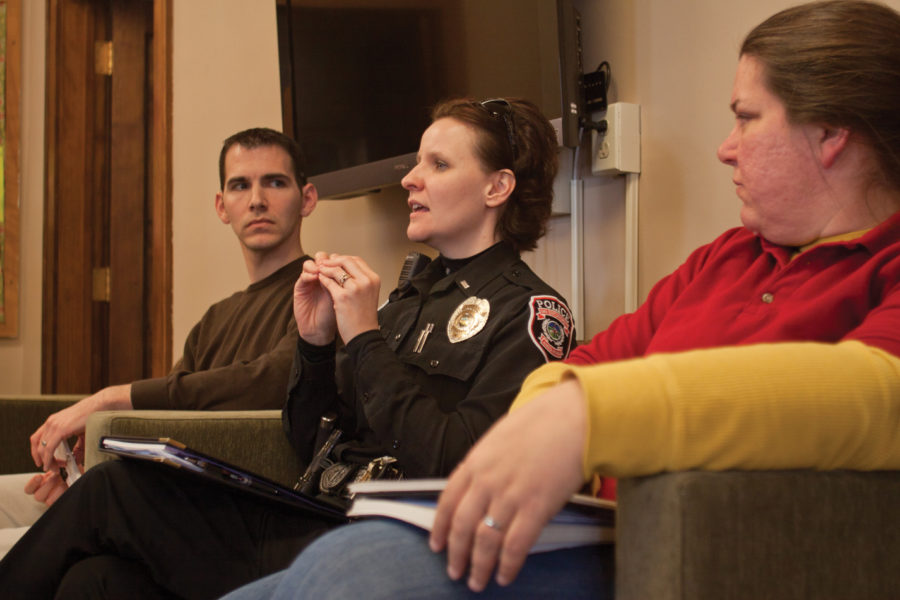More women become ISU police officers
Photo: Whitney Sager/Iowa State Daily
Program coordinator in the Dean of Student’s Office, Kipp Van Dyke, Carrie Jacobs from ISU Police, and Assistant Dean of Students, Michelle Boettcher, discuss issues dealing with stalking on Tuesday, Jan. 25, in the Sloss House. “Anyone can be stalked. Anyone can be engaged in activities that can be considered stalking,” Boettcher said. The event held in honor of Stalking Awareness Month was part of the monthly “Take Time on Tuesdays” series put on by the Margaret Sloss Women’s Center.
November 19, 2015
A smile shot across Deborah Larkin’s face as she remembered the early days of her career in the law enforcement.
There was one thing that worked against her: She was a woman.
“Have I ever been treated differently on the job because I’m a woman?” Larkin said, a lieutenant at the ISU Police Department. “Are you kidding? Get out of town.”
Larkin landed her first job in law enforcement by suing the department. The Equal Employment Opportunity Commission, which enforces civil rights laws against workplace discrimination, had just been created. The department had hired a man who didn’t have a college degree; Larkin did. She explained lawsuits were a common method women used to obtain jobs.
“[Women] had carved a path in the dirt to the equal employment office from all of our trips over there,” Larkin said.
Larkin has been in the field since 1981, when she was at the University of Nebraska. She was there for six years and then came to Ames, where she has been for the last 26 years. She started as a patrol officer and then shuffled through a variety of positions including detective, patrol sergeant and patrol lieutenant.
When Larkin first started her career, she was issued a uniform that included a pencil skirt, as opposed to pants like the men. Larkin asked a male co-worker to order pants for her because she was not permitted to order them herself. She never wore the skirt.
Larkin recalled that dispatchers used to screen calls and send only the men to the violent crimes, while women were assigned to routine calls that wouldn’t put them in danger.
Often times, women cops were assigned to sexual assault investigations because they were believed to be able to connect with victims solely because of being women. However, Larkin said that didn’t always work out.
“I worked with another woman officer that was the meanest of them all,” Larkin said. “She meant well, but she didn’t last long as a sexual assault investigator. She wasn’t sensitive enough for the victims.”
Despite the start, law enforcement has made a lot of progress in the last several years.
According to the National Institute of Justice, in the 1970s, only 2 percent of officers were women. Today, women make up about 13 percent of the police force, according to the Department of Justice.
Despite the rising numbers, gender inequality is still evident in the police department today.
ISU Police has 37 officers, seven of whom are female. It has three females on patrol who are in their training phase, three officers in administrative level positions and one at the academy.
Natasha Greene is one of the three female officers who are currently in training with ISU Police. She got involved with the department after working with it as the community liaison with Assault Care Center Extending Shelter and Support.
After working alongside officers in the department, she recognized how community-oriented the department was and immediately became fascinated with law enforcement. Since she was raised in a gendered society, Greene never thought of law enforcement as being a realistic occupation for her.
The laws have changed, but society has not.
“We are gendered at such a young age,” Greene said. “We are given a false assumption of what law enforcement entails or how it should be done. I think that holds women back from thinking that they can fill these roles.”
Greene and other officers believe that Iowa State is welcoming compared to other universities, and it has a majority of students who share the welcoming quality. She admits that this does not stand true everywhere, unfortunately.
“While I’ve never been outrageously insulted by any of the students, it’s been interesting to watch some people interact with me,” Greene said. “If there’s both a male and a female officer on the scene, the students’ assumptions of who is in charge or who gets respect can be a little different and often is swayed toward the male.”
Sara Jensen, a lieutenant at ISU Police, has 13 years of experience under her belt. She highlighted the fact that ISU Police has a philosophy that allows for anyone and everyone to have a place in the department.
“One of the things that my chief told me when I was hired was, ‘You don’t have to prove yourself. We’ve already hired you. You be you.’ We take this philosophy and assume that each office is going to police in their own way, regardless of gender, as long as they’re in line with the department values and ethics,” Jensen said. “We’re very fortunate here. I’ve never felt like, ‘Oh my gosh, I’m an outcast.’”
The female officers who are currently in training will complete it at the end of the month. They will then be active patrol officers.
“It sounds super corny, but the No. 1 reason I wanted to take this job is because I enjoy helping people. Also the ability to want to learn more every day is extremely vital,” Greene said. “I am fascinated by law enforcement, and I hope that in 20 years, I’m still trying to learn new things. I believe that makes you a better officer, no matter what gender you are.”







